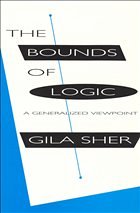Nicht lieferbar

The Bounds of Logic
A Generalized Viewpoint
Versandkostenfrei!
Nicht lieferbar
The Bounds of Logic presents a new philosophical theory of the scope and nature of logic based on critical analysis of the principles underlying modern Tarskian logic and inspired by mathematical and linguistic developments.The Bounds of Logic presents a new philosophical theory of the scope and nature of logic based on critical analysis of the principles underlying modern Tarskian logic and inspired by mathematical and linguistic developments.Extracting central philosophical ideas from Tarski's early work in semantics, Sher questions whether these are fully realized by the standard first-orde...
The Bounds of Logic presents a new philosophical theory of the scope and nature of logic based on critical analysis of the principles underlying modern Tarskian logic and inspired by mathematical and linguistic developments.
The Bounds of Logic presents a new philosophical theory of the scope and nature of logic based on critical analysis of the principles underlying modern Tarskian logic and inspired by mathematical and linguistic developments.
Extracting central philosophical ideas from Tarski's early work in semantics, Sher questions whether these are fully realized by the standard first-order system. The answer lays the foundation for a new, broader conception of logic exemplified in numerous recent mathematical and linguistic writings. By generally characterizing logical terms, Sher establishes a fundamental result in semantics. Her development of the notion of logicality for quantifiers of many variables and her work on branching are of great importance, for linguistics.
Sher outlines the boundaries of the new logic and points out some of the philosophical ramifications of the new view of logic for such issues as the logicist thesis, ontological commitment, the role of mathematics in logic, and the metaphysical underpinnings of logic. She proposes a 'constructive' definition of logical terms, reexamines and extends the notion of branching quantification, and discusses various linguistic issues and applications.
Gila Sher is Assistant Professor of Philosophy at the University of California at San Diego.
Review text:
'From central considerations of philosophical logic, Gila Sher draws out implications through the study of quantification for logic, mathematics, and linguistics. She secures the characterization of logical terms in its most general sense - establishing a fundamental result in the foundation of semantics. The book will be of great importance for those interested in semantics from philosophical and linguistic perspectives.'
-- Robert May, Professor of Linguistics and Cognitive Sciences, University of California, Irvine
The Bounds of Logic presents a new philosophical theory of the scope and nature of logic based on critical analysis of the principles underlying modern Tarskian logic and inspired by mathematical and linguistic developments.
Extracting central philosophical ideas from Tarski's early work in semantics, Sher questions whether these are fully realized by the standard first-order system. The answer lays the foundation for a new, broader conception of logic exemplified in numerous recent mathematical and linguistic writings. By generally characterizing logical terms, Sher establishes a fundamental result in semantics. Her development of the notion of logicality for quantifiers of many variables and her work on branching are of great importance, for linguistics.
Sher outlines the boundaries of the new logic and points out some of the philosophical ramifications of the new view of logic for such issues as the logicist thesis, ontological commitment, the role of mathematics in logic, and the metaphysical underpinnings of logic. She proposes a 'constructive' definition of logical terms, reexamines and extends the notion of branching quantification, and discusses various linguistic issues and applications.
Gila Sher is Assistant Professor of Philosophy at the University of California at San Diego.
Review text:
'From central considerations of philosophical logic, Gila Sher draws out implications through the study of quantification for logic, mathematics, and linguistics. She secures the characterization of logical terms in its most general sense - establishing a fundamental result in the foundation of semantics. The book will be of great importance for those interested in semantics from philosophical and linguistic perspectives.'
-- Robert May, Professor of Linguistics and Cognitive Sciences, University of California, Irvine



